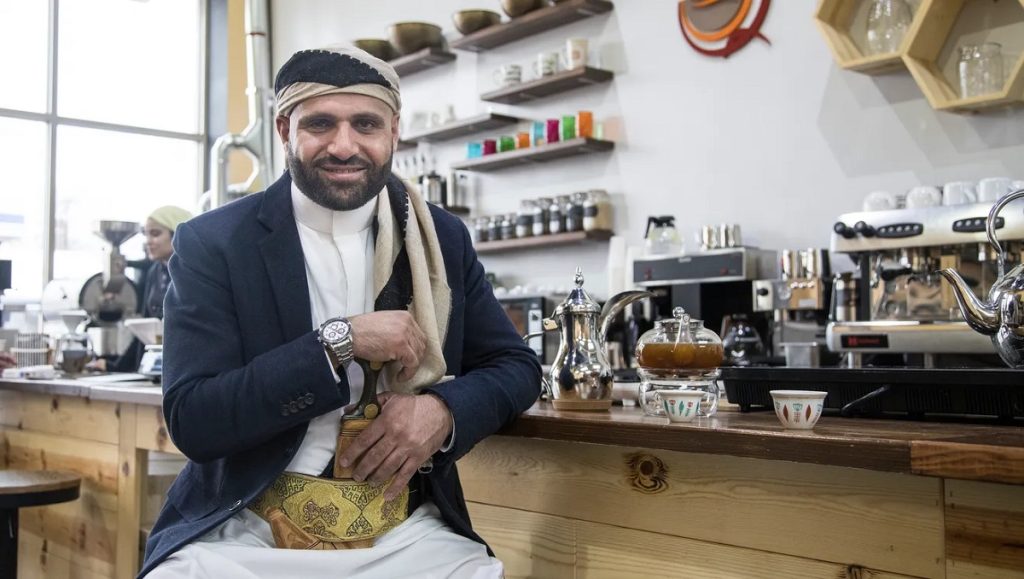House of Coffee: Ibrahim Al-Hasbani’s Journey to Bringing Yemeni Coffee Stateside
How Ibrahim Al-Hasbani’s “House of Coffee” and other Yemeni chains are reshaping U.S. coffee culture while overcoming war, economic challenges, and global competition.

In 2017, Ibrahim Al-Hasbani, founder of House of Coffee in the United States, proudly declared: “Yemeni coffee is number one.” Since then, his venture—which now operates 23 branches from Texas to New York—has become one of the leading Yemeni café chains rapidly expanding across the American market.
Al-Hasbani, who immigrated to the U.S. after the war in Yemen began, built House of Coffee not only as a business but as a cultural bridge. “I want to share the culture. I want to share the coffee. I want to share the history,” he explains at Coffee House in Dearborn, Michigan, where his team serves traditional Yemeni drinks.
A Yemeni Café Wave in the U.S.
In recent years, Yemeni cafés have flourished across U.S. cities and shopping centers. Chains such as Mokafé, Haraz, and Al-Qamaria have successfully introduced Yemeni coffee to American consumers, drawing on its historic role as the birthplace of global coffee trade.
These cafés are celebrated not only for their beautifully designed interiors and late-night atmospheres but also for their distinctive drinks infused with cardamom and ginger. Alongside beverages, they serve desserts such as knafeh cheesecake with hazelnuts and artisanal chocolate-covered cakes.

Yemeni Coffee: A Heritage of Flavor
Yemeni coffee is among the oldest varieties in the world, giving it unmatched prestige among enthusiasts. Euan Bowler, a Scotland-based coffee expert, praised its uniqueness in his newsletter The Pour Over: “Yemeni coffee has a special charm among connoisseurs due to its rich history and unique flavors.”
He added that Yemeni cafés in America have lived up to high expectations: “What they offer is only the finest coffee.”
Economic and Political Challenges
Yet the Yemeni coffee industry faces significant hurdles. Global coffee prices have surged due to climate change, disrupting supply chains worldwide—including Yemeni exports. Bowler noted that some traders are even hoarding coffee stocks to hedge against further price hikes.
Importing Yemeni beans is also complicated by war. Coffee is typically sourced from family farms near Sana’a, but transporting shipments to Aden’s port has become increasingly difficult. “Before the war, the trip from Sana’a to the port took 10 hours,” Al-Hasbani explains. “Now it can take two days.” These delays raise costs and strain café operations in the U.S.
Compounding the problem are political risks. With Yemen’s Houthis designated as a terrorist organization by the U.S., Yemeni traders fear potential sanctions, as 90% of Yemeni coffee comes from Houthi-controlled areas. Mokhtar Alkhanshali, founder of Port of Mokha Coffee, warns: “Any trader could be considered as indirectly supporting terrorism.”
Despite these challenges, Yemeni café owners emphasize that their ultimate goal is to support small farmers in Yemen’s rural areas, where coffee trees remain a lifeline.

Beyond War and Famine
For Al-Hasbani, Yemeni cafés in America are about more than coffee. They represent an opportunity to reshape Yemen’s image abroad. “I want House of Coffee to be a welcoming place where Americans see Yemenis not just as victims of war and famine but as the people who gave the world coffee,” he says.
The war has touched Al-Hasbani’s life personally—he lost his mother and sister due to the collapse of Yemen’s health system. “The war has taken nearly a quarter of a million lives, including thousands of civilians,” he reflects. “The hardest part is watching loved ones suffer without being able to help.”
Still, he remains hopeful. “We are behind every morning smile,” Al-Hasbani says, expressing pride in offering authentic Yemeni coffee that brightens lives and strengthens cultural ties in America.



